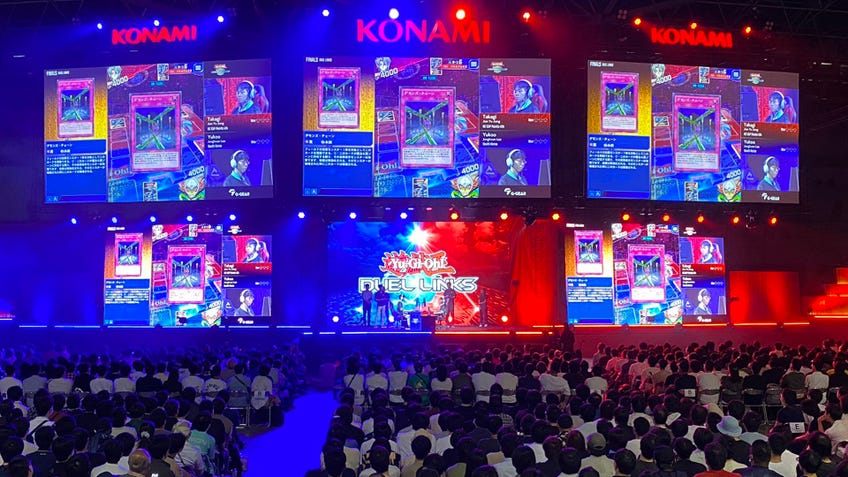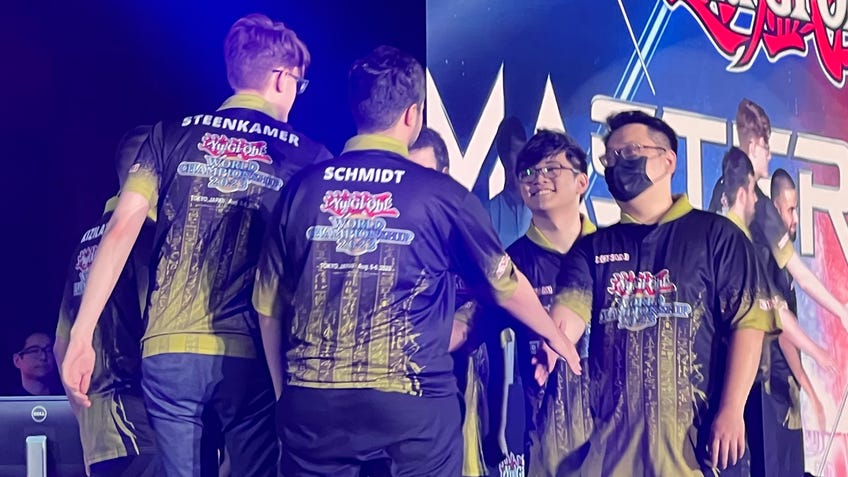Who gets to play Yu-Gi-Oh? The TCG’s recent exclusions fly in the face of its community spirit
European cancellation of the latest Speed Duel set and revised Japanese tournament rules are baffling in the wake of efforts to welcome new players.
Yu-Gi-Oh! maker Konami has taken many steps to improve accessibility of the trading card game in recent years, even during the depths of COVID-19 when in-person tournaments became impossible. The publisher deserves praise for the steps taken to encourage newcomers to the game and introduce them to all levels of play - reaching out to new players in the digital realm while keeping the cost of physical cards down through accessible reprints, offering new entry points through two-player starter decks and a cheaper, simplified format in Speed Duel, complete with its own events.
It’s a far more accessible state of play compared to what we saw just five years ago. Yet this open-arms outreach to new and growing audiences is what makes recent decisions from Konami so baffling in the eyes of many current players.
The first rumblings of discontent from fans came in early March, with the sudden delisting of the most recent planned release for Speed Duel, Midterm Destruction, in regions across Europe. While certainly far from the most popular way to play, the game has always had its share of dedicated fans that have ensured this Western-only format of the game has persevered. Yet the delisting came without prior announcement or even acknowledgement from Konami Europe, even as release events for the set were announced for North American territories - complete with exclusive prizes like Dandelion playmats.
Only following its international release did a small addendum on the Konami website for cards legal for competition in Europe confirm the cancellation, and even then only indirectly. With Midterm Destruction unavailable in Europe, it was stated that cards from the set would be illegal for competitive use in Speed Duel events within the region, as is standard for similar region-exclusive releases.
These past two weeks, two more announcements regarding Yu-Gi-Oh!’s upcoming National and World Championships similarly caused a stir amongst fans. Firstly, it was revealed that the previously-announced World Championships in Seattle in September would not follow the format of last year’s event in Japan or pre-COVID championship events, taking place entirely behind closed doors for the select few invited players. Whereas the finals in Tokyo in 2023 saw thousands of spectators watch on from the audience, take part in side events and snag some exclusive merchandise, fans would instead be encouraged to “support the WCS Duelists at the local level”.
Meanwhile, it was revealed that the regional Japan Championships would not allow people to qualify as the nation’s representative for the World Championships unless they were Japanese citizens, regardless of their residency status or how long they had lived in the country.
This differs from rules seen elsewhere. In North and South America and Europe, for example, players can compete in regionals in any region, although they do have to compete in the National Championships of the region where they have permanent residence. For example, players from Europe who qualify via regionals in the US still have to compete in the European Championships. However, exceptions are made for players who have immigrated from one region to another for work or education.
Why should foreign players in a country continue playing Yu-Gi-Oh! if they can’t participate in the same competitions as their peers?
The new rules for the Japan Championships ban anyone who isn’t a native Japanese citizen from competing in Yu-Gi-Oh!’s biggest event, even if they have lived in the country for years and call it home. This is a requirement solely for the Japan Championships - players with residency but not citizenship can still participate in local events and larger competitions such as YCS Japan.
As of 2022, over 2.5 million people living in Japan were immigrants on some form of visa, making up just over 2% of the country. This number, notably, does not include those who have renounced citizenship of another country - a requirement to claim Japanese citizenship - making the true number of immigrants living in Japan higher than what is officially reported. Excluding a dip in immigration during COVID-19, this number has been increasing in recent years, with a large number of young people moving to Japan for education or work. With such strict requirements to become a Japanese citizen, many people remain on residency visas even decades after initially moving to the country.
Under the revised entry criteria, unless they were born in Japan or have renounced their birth nationality to become a Japanese citizen, immigrants will no longer be able to compete on the world stage of Yu-Gi-Oh!
Card games like Yu-Gi-Oh! are all about community. They’re a way to meet new people, find things in common with strangers and feel less alone. Especially as an immigrant living in another country without the friendships built up over years, it’s a chance to make connections that would otherwise be impossible. Yet such rules exclude these players from that community purely due to their nationality. Why should they continue playing Yu-Gi-Oh! if they can’t participate in the same competitions as their peers?
It’s one thing to publicly state your game as being open to all, but actions speak louder than words.
So, who actually gets to participate in modern Yu-Gi-Oh? Will the casual player who doesn’t want to play in high-level tournaments but enjoys being around other fans and wants to watch high-level play on the biggest stage participate? Because now that person can’t attend the World Championships as a spectator. How about the people who want to retread nostalgia or play in a cheaper format by picking up a box of Speed Duel to compete with friends? Their format was cancelled without prior warning. How about the immigrant looking to make friends - only to be banned from competition because of where they were born?
It was once assumed that everyone could compete or participate as both spectator and player, and Konami made efforts to accommodate all these audiences. It’s one thing to publicly state your game as being open to all, but actions speak louder than words and communication matters. The rules banning non-Japanese citizens from the Japan Championships were not widely announced but discovered and amplified by Kris, a TCG YouTuber and content creator, and Rurohan: two foreign residents living in Japan who would be left unable to participate under this ruleset. Speed Duel was silently killed without an official statement, with the fate of future events for the format now uncertain.

When asked for comment on the situation with citizenship regulations for the Japan Championship, Konami Japan told Dicebreaker: “The Japan Championship is a qualifier to select players to represent Japan in the WCS. The rules around requirements for entry are always under review and we'll continue to monitor the situation moving forwards.” Konami Europe did not respond to questions about the status of Speed Duel in the region and the decision to host the World Championships behind closed doors.
If everyone is truly allowed to participate in Yu-Gi-Oh!, where do these recent events fit into this philosophy? While Konami’s acts to make the game more accessible to a broader audience should be commended, they’re undermined by decisions that exclude audiences without proper communication with those impacted. As a Yu-Gi-Oh! player based in Japan, I would myself be unable to compete at the highest level in the card game, despite this being my personal region for competition. Where does that leave someone like me in the world of Yu-Gi-Oh?
Accessibility is more than releasing a few cool products - it requires communication. And when concerns are raised regarding organisational decisions, it requires being open with fans in order to address their concerns. It doesn’t matter how easy it is to get started playing a card game if you don’t know who you’re up against or what you should expect. Communication and acceptance is the true key to long-term health.

